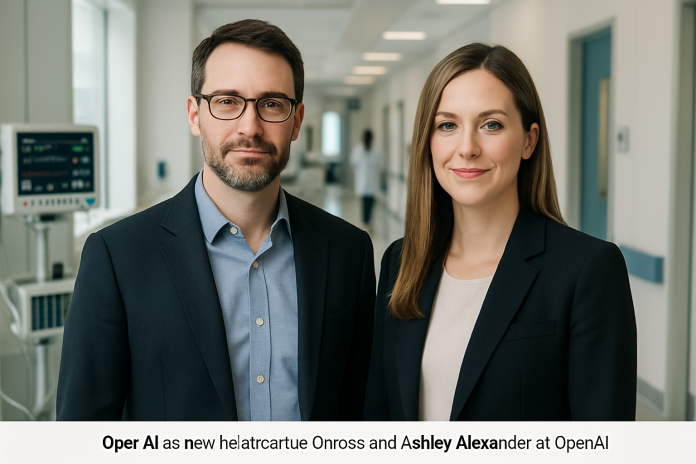Quick Take
- Nate Gross (Doximity co-founder) leads OpenAI’s healthcare strategy expansion
- Ashley Alexander (ex-Instagram VP) joins as VP of Product for health sector
- Clinical partnerships central to AI tool development and validation
- HealthBench tool validates AI applications in medical settings
OpenAI makes strategic healthcare play with industry veteran appointments
OpenAI has brought on board two seasoned technology leaders to drive its push into healthcare artificial intelligence, marking a significant commitment to transforming how medical care gets delivered through advanced AI systems.
The company announced the hiring of Nate Gross, who co-founded the healthcare networking platform Doximity, to head up OpenAI’s healthcare initiatives. Alongside him comes Ashley Alexander, who previously served as co-head of product at Instagram and will now take on the VP of Product role focused specifically on health applications.
Deep Healthcare Knowledge Drives Strategy
Gross brings valuable healthcare industry insights from his experience building Doximity into a major platform that connects medical professionals. His appointment shows OpenAI understands that winning in healthcare AI means really grasping how clinicians work and what they actually need.
“Our approach centers on co-creating technologies with healthcare professionals,” the company stated, emphasizing collaboration over standalone development.
Alexander’s consumer tech background from Instagram puts her in a good position to connect sophisticated AI capabilities with healthcare applications that people can actually use. She’ll be working on tools for both doctors and patients, with a focus on making operations run smoother and improving care quality.
Building Trust Through Healthcare Partnerships
At the same time, OpenAI is working with established healthcare organizations to make sure its AI tools fit naturally into how clinics and hospitals already operate. These partnerships help build trust with practitioners and show that the technology works in real medical settings.
The company has created HealthBench, an internal testing platform designed specifically for healthcare AI applications. This tool lets OpenAI measure how well its systems perform against medical standards and regulatory requirements.
Complete Healthcare AI Systems in Development
These leadership hires represent more than just talent recruitment—they signal OpenAI’s plan to build entire healthcare AI ecosystems, not just basic models. This strategy tackles the challenge of turning powerful AI into practical medical tools.
The approach covers three main areas: improving how care gets delivered, changing how patients interact with healthcare systems, and making healthcare operations more efficient. Each area needs the specialized knowledge that these new executives bring from their backgrounds.
Market Competition and Strategic Positioning
OpenAI’s healthcare move puts the company in direct competition with existing medical AI firms, while giving it the advantage of its advanced language models. The mix of proven healthcare leadership and cutting-edge AI creates a unique position in the market.
The appointments indicate OpenAI sees healthcare as a core business priority, not just an experiment. By recruiting executives who have successfully scaled both healthcare and consumer technologies, the company shows it’s in this for the long haul.
Industry watchers point out that healthcare AI success requires balancing tech innovation with ethical responsibility—something that experienced leadership helps navigate. The new team’s job includes making sure AI tools support doctors rather than trying to replace human decision-making.
Implementation Timeline and Development Priorities
With leadership now set, OpenAI’s healthcare projects are expected to pick up pace through 2024. The company plans to focus on careful integration and testing rather than rushing products to market, which makes sense given healthcare’s strict regulatory and safety demands.
This strategic shift shows OpenAI’s transformation from an AI research company to a broad technology provider across multiple industries. Healthcare’s complexity and regulatory requirements make it both a tough challenge and a potentially game-changing application area for advanced AI systems.






